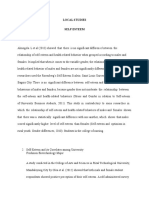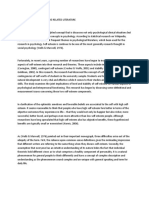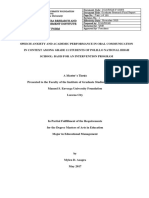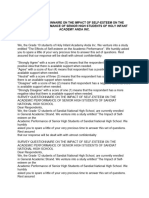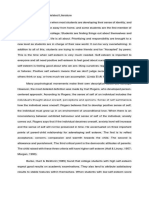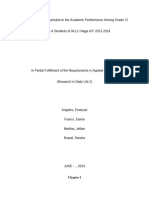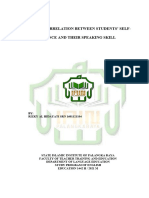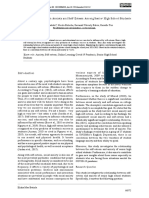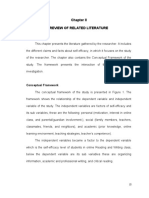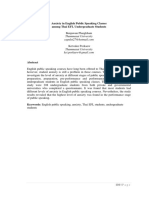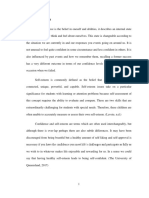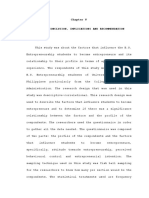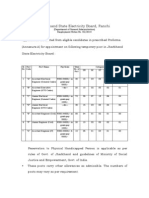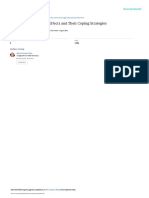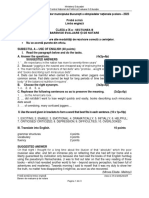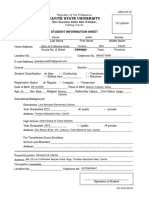NAVIGATING THE SELF-CONFIDENCE LANDSCAPE: AN IN-DEPTH
QUALITATIVE EXPLORATION AMONG HOSPITALITY MANAGEMENT
STUDENTS
A Research Paper Proposal Presented
to the Faculty of Professional Schools of the
University of Mindanao
Davao City
In Partial fulfillment of the Requirements in
Purposive Communication
TRESHA FLOR CAÑETE
MAYLYN CATUBAY
JHANNA MAE COMAJES
KENJI CUBIAS
APRIL ANGELIE GABLINES
November 2023
1
� CHAPTER 1
BACKGROUND OF THE STUDY
Introduction
The quest for self-confidence has long been an integral part of personal and
professional development. In the realm of hospitality management, where interaction
with clients and colleagues is paramount, self-confidence plays a crucial role in an
individual's success. However, the self-confidence landscape for hospitality
management students is a complex and multifaceted terrain that requires a deeper
understanding. In contrast to (Akbira & Sahibzada,2020) findings on Students’ self-
confidence and its impacts on their learning process, that only a small percentage of
the students lacked confidence in themselves, while the majority did. Additionally, the
degree to which students feel confident in themselves has an impact on their learning
in the following areas: participation; setting goals; growing interest in the material;
lowering anxiety; comfort level with teachers and peers; and speaking up in class and
offering an opinion on the material.
Based from the study in the Philippines about self-confidence, it was found that
students education and involvement in school activities is found to be positive,
Moneva (2020). It implies that all of the following are discovered to be interactive
with students. The researcher found that students who are introverted or extroverts
have the same level of confidence. Students as a result display a variety of opinions
about their interests. It honors their personality and way of living.
2
� According to the findings of (Autida,Dabalos, and Lauron,2022), an individual's
degree of self-efficacy has no discernible effect on how well they perform in online
learning environments. This implies that students' performance in finishing online
academic assignments is unaffected by their level of confidence in their academic
abilities. Students' online academic endeavors do not seem to be significantly
impacted by the psychological process of self-efficacy. It is demonstrated that there is
little relationship between self-efficacy levels and performance in online courses.
This literature review essentially adds to the ongoing discussion on self-
confidence by consolidating the body of knowledge, pointing out areas that require
more research, and highlighting the useful implications for the welfare of individuals
and society as a whole. As we go forward, cultivating a self-assured and empowered
society will require a comprehensive strategy that takes into account the social,
cultural, and individual aspects of self-confidence.
Research Gap and Purpose
Despite the growing body of literature on self-confidence among higher
education students, there appears to be a research gap in understanding the nuanced
experiences of self-confidence specifically among students pursuing degrees in
Hospitality Management (HM). While studies have explored self-confidence in
general academic contexts, there is limited qualitative research that delves into the
unique challenges, influencers, and manifestations of self-confidence within the
context of HM education. Hospitality Management students undergo a distinct set of
educational experiences, including internships, customer interactions, and a dynamic
3
�industry environment. These factors may shape their self-confidence in ways that
differ from students in other disciplines. The existing research predominantly focuses
on broad aspects of self-confidence or is limited to specific academic disciplines,
neglecting the nuances of the HM field. Addressing this research gap is crucial for
educators, administrators, and policymakers to design tailored interventions and
support systems that cater to the specific needs of HM students. A qualitative
exploration can uncover the intricacies of self-confidence development, shedding light
on the role of practical experiences, interpersonal skills, and industry-specific
challenges. In essence, this study aims not only to uncover the intricacies of self-
confidence development among HM students but also to provide actionable insights
that can positively impact both educational practices and industry expectations in the
context of hospitality management. Such insights can contribute to the development
of targeted strategies for enhancing self-confidence among HM students, ultimately
better preparing them for successful careers in the hospitality industry.
Research Questions
1. How do hospitality management (HM) students perceive and define self-confidence
within the context of their academic and professional experiences, and what factors
contribute to the development or hindrance of self-confidence in this specific
educational and career path?
2. What strategies and coping mechanisms do HM students employ to overcome self-
confidence challenges, and how do they navigate the dynamic landscape of self-
assurance in the unique context of hospitality management education and future
career aspirations?
4
� CHAPTER 2
METHODOLOGY
Research Design
This qualitative study mainly uses a case method for data collection. This
method helps us understand complex topics to navigate the confidence landscape in
University of Mindanao students. This approach is valuable because we can collect
detailed information from individual participants and obtain general information. The
case method allows us to examine in a nuanced manner factors that influence the
development of hospitality management students' self-confidence, and influence their
ability to overcome challenges and excel in their studies. We can also take into
account the city's unique culture and circumstances, making the research more
relevant. This method is like a magnifying glass that helps us see the finer details of
hospitality management students' confidence.
Research Participants
The selection of participants and the establishment of inclusion and exclusion
criteria are pivotal steps to ensure the study's validity and relevance. We will be
needing fifteen participants for this study. In terms of inclusion criteria, participants
must be student of University of Mindanao in Davao City, with their age ranges
specified if relevant to the study (e.g., 18-23 years old). This strategic approach
5
�ensures diversity within the sample concerning factors such as age, school year and
how they manage the situation that related into self-confidence.
Research Locale
The study will be done on the University of Mindanao's Matina campus, and
respondents will be interviewed on the institution's school campus. This study was
conducted on students enrolled in the hospitality management program (BSHM). The
research will be carried out during the first semester of the school year 2023-2024.
Research Instruments
The researcher intends to use the semi-structured interview method in this
study. A semi-structured interview consists of a series of structured but more open-
ended questions asked by a group of people to gather information and facts. At the
same time, additional questions can be asked during the interview to clarify and/or
explain certain issues in more detail. The first section of the semi-structured interview
is used to examine the students' self-confidence experiences in detail. The second
component is to ask questions that respondents respond to. In this case, we will use
the semi-structured method to determine the respondents' level of agreement with
each statement.
6
�Data Gathering Procedure
The study aims to explore and navigate self-confidence landscape among
Hospitality Management students of the University of Mindanao using qualitative
research methods. The data gathering process will involve conducting interviews with
a selected sample of students. To begin, a suitable sample size will be determined,
considering factors such as diversity and representation among the participants. A
semi-structured interview guide will be developed, consisting of open-ended
questions that allow students to share their experiences, perspectives, and reflections
on self-confidence. Participants will be selected through purposive sampling, ensuring
for a comprehensive exploration of self-confidence experiences. Informed consent
will be obtained from each participant before the interviews are conducted, ensuring
their voluntary participation and confidentiality. During the interviews, participants
will be encouraged to discuss their self-confidence levels, experiences of self-doubt or
self-assurance, and how these factors have affected their academic journey as an HM
student. The interviews will provide rich qualitative data, capturing the nuances and
complexities of self-confidence in the context of Hospitality Management studies.
Once the interviews are complete, data analysis will involve a thematic analysis
approach. The recorded interviews will be transcribed, and key themes related to self-
confidence experiences and patterns among hospitality management students.
7
�Data Analysis
The data will be coded and categorized, allowing for the identification of
commonalities, differences, and significant insights. The findings from the qualitative
data analysis will provide a deeper understanding of the self-confidence landscape
among hospitality management students. The study will contribute to the existing
literature on self-confidence and education, shedding light on the subjective
experiences and perceptions of students in this specific academic field.
References
Akbari, O., & Sahibzada, J. (2020). Students’ self-confidence and its impacts on their
learning process. American International Journal of Social Science Research, 5(1), 1-
15.
De Goma¹, I. A., & Moneva, J. C. (2020). Introvert–Extrovert Personality Types and
Self-confidence-A Case Study from Philippines.
Autida, J. S., Dabalos, R. J. G., & Lauron, P. G. (2022). Self-efficacy and Academic
Performance Among college students in Davao City.




